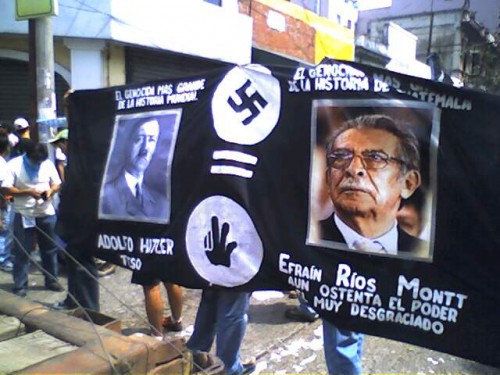Guatemala: From an Overturned Conviction to a Surprising Extradition
by Horacio Castellanos Moya / June 5, 2013 / No comments
Two trials that have put Guatemala on the front page of international news.

Protest against General Efraín Ríos Montt, former de facto president of Guatemala, who was recently tried on charges of genocide in the 1980s. Photo: Wikimedia Commons.
The former president of Guatemala, Alfonso Portillo, was extradited to the United States on May 24. He faces charges in a New York court of laundering $70 million in U.S. banks during his term of office (2000-2004). Portillo’s extradition had been approved since November 2011, but the former president remained ensconced in a military hospital due to health problems, and by May his extradition case had gone cold. His sudden extradition came as a surprise.

- Corkscrew is focused on Latin American issues. Literature, journalism and politics are the main concerns of this column. A corkscrew is useful only if it opens a bottle, hopefully full of something that would enlighten our spirits, but we could also set loose a cruel Genie or a rotten wine. The author will follow this principle: look for topics that open debates, new perspectives, and controversy. Cheers!

- Horacio Castellanos Moya is a writer and a journalist from El Salvador. For two decades he worked as a journalist in Mexico, Guatemala, and his own country. He has published ten novels, five short story collections and two books of essays. He was granted residencies in a program supported by the Frankfurt International Book Fair (2004-2006) and at City of Asylum/Pittsburgh (2006-2008). In 2009, he was a guest researcher at the University of Tokyo. Currently he teaches at the University of Iowa.
Instead, national and international attention was focused on the trial of General Efraín Ríos Montt, who was charged with genocide and whose 80-year prison sentence was overturned by the Guatemalan Constitutional Court on May 20, exactly four days before Portillo’s extradition. Through the United Nations’ involvement the case against Ríos Montt had the support of the international community. His sentencing, by a Guatemalan tribunal, was a triumph not only for the survivors of indigenous Mayan communities who were subjected to massacres during Ríos Montt’s term as head of state in the early 1980s, but also for the human rights organizations who supported them. The Guatemalan Constitutional Court’s subsequent overturning of the conviction and sentence was a bucket of cold water in the face of those who believed progress had been made in establishing a justice system in Guatemala.
The sudden extradition of Portillo has been viewed as a move by General Otto Pérez Molina’s government to calm international pressure, particularly from the U.S. government, following the reversal of Ríos Montt’s conviction. Pérez Molina handed over Portillo as a trade-off. Some might believe that Ríos Montt and Portillo are two rats from the same sewer, and that Portillo’s extradition represents some small victory. But that’s not the way it is. There is a huge difference between the two—not just because one is military and the other a civilian, but because the nature of their crimes is also different. Portillo is accused of being a shameless thief who took advantage of his time in office as the president of Guatemala to steal millions and launder the money abroad. Sure, this is a fairly common occurrence in Latin America, but that certainly does not excuse or justify it. The case of Ríos Montt is qualitatively different: He was a military officer who, as head of state, sent the national armed forces to murder tens of thousands of defenseless, indigenous Mayan people. His trial and sentencing had tremendous symbolic importance, both for the implementation of justice and as reparation for the survivors and victims of the genocide.
It’s not surprising that Pérez Molina has created a smoke screen by handing over Portillo for extradition. He is indirectly implicated by the proceedings against Ríos Montt since, during the period of the genocide, Pérez Molina was an officer commanding troops in the areas where massacres were perpetrated. His motives for supporting the overturning of the Ríos Montt conviction, and for using the extradition of Portillo as a diversionary tactic, are more than evident.




